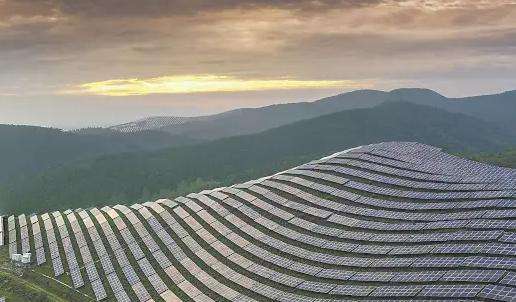Principles of thermal power generation
Thermal power generation generally refers to the use of thermal energy generated when materials Fuels are burned to heat water, transforming the water into water vapor at high temperature and high pressure. General term for the method by which water vapor then drives a generator to produce electricity.
Most thermal power plants use coal as their primary energy and use belt drive technology to transport the treated pulverized coal to the boiler. The pulverized coal burns to heat the boiler and turns the boiler water into steam after the primary. Heating, water vapor enters the high pressure cylinder. In order to improve thermal efficiency, the water vapor must be heated and enter the medium pressure cylinder. The steam coming fromof the medium pressure cylinder is used to drive the turbogenerator to produce electricity.
Principle of thermal energy production A thermal power plant is a factory that uses coal, oil and natural gas as fuel to produce electrical energy. Its basic production process is as follows: fuel is burned in the boiler. to heat water to turn fuel into steam. Chemical energy is converted into thermal energy, the steam pressure drives the rotation of the steam turbine, the thermal energy is converted into mechanical energy, then the steam turbine drives the rotation of the generator, converting the energy mechanics in electrical energy; its classification is: according to fuel, coal-fired power plants, oil-fired power plants, gas-fired power plants, waste heat power plants, power plantsusing trash and industrial waste as fuel; at steam pressure and temperature, medium and low pressure power plant (3.92 MPa, 450 degrees), high pressure power plant (9.9 MPa, 540 degrees), high pressure power plant (9.9 MPa, 540 degrees), ultra high pressure (13.83 MPa, 540 degrees), subcritical power plant (16.77 MPa, 540 degrees), supercritical pressure power plant (22.11 MPa, 550 degrees); divided by prime mover, condensing steam turbine power plant, gas turbine power plant, internal combustion engine power plants, steam-gas turbine power plants, etc. ; depending on the energy produced, condensing power plants (only generate electricity), thermal power plants (electricity production and heat supply), small capacity power plants (less than 100 MW); large capacity power plants (100-250MW), large and medium capacity power plants (250-1,000 MW), large capacity power plants (above 1,000 MW) China's current largest thermal power plant: Zhejiang Beilun Port Power Plant, with an installed power plant; capacity of 3 million KW (or 3,000 MW) and five units of 600,000 KW (600 MW). The principle of hydropower is to use water with potential energy or kinetic energy to flush the turbine, and the turbine starts to rotate if we connect a generator to the turbine, the generator can start to produce electricity. If we raise the water level to flush the turbine, we can see that the speed of the turbine increases. Therefore, it can be seen that the greater the water level difference, the greater the kinetic energy obtained by the turbine and the greater the electrical energy that can be converted. This is the basic principle ofhydroelectric power plant.
The energy conversion process is as follows: the gravitational potential energy of the upstream water is converted into the kinetic energy of the water flow. As the water flow passes through the hydraulic turbine, kinetic energy is transferred to the steam. turbine. The hydraulic turbine drives the generator to rotate and converts kinetic energy into electrical energy. It is therefore the process of converting mechanical energy into electrical energy.
Due to the different natural conditions of hydropower plants, the capacity and speed of hydroelectric generator set vary greatly. Usually, small water turbines generate electricity, high-speed hydrogen generators driven by hydraulic turbines and impact turbines mainly adopt horizontal structures, while large and medium-speed generators mainly adopt horizontal structures.vertical (see figure). Since most hydroelectric plants are located far from cities, they usually have to power the load via long transmission lines. Therefore, the power system imposes higher requirements on the operational stability of the hydroelectric generator: the engine parameters must be carefully selected. ; The required moment of inertia is large. The appearance of a hydrogenerator is therefore different from that of a steam turbine generator. Its rotor has a large diameter and a short length. The hydrogenerator unit requires a short time to start and connect to the grid, and the operation schedule is flexible. In addition to general electricity generation, it is particularly suitable as a peak shaving unit and as an emergency backup unit. The maximum capacity of the hydrogenerator unit reached 700,000 kilowatts. Product principlection of electricity in a nuclear power plant 1. There are 3 locations: reaction vessel (the nuclear fuel reacts here), steam generator, steam turbine
2. There are 2 loops: 1 loop (or "nuclear island") connected to the reaction The container is connected to the steam generator, and the 2nd loop (or "classic island") connects the steam generator and the steam turbine
3 . Process:
(1) The cooling water from the 1st loop passes through the reaction When it enters the vessel, it absorbs the heat from the nuclear reaction and the temperature rises as it passes through the generator steam, it transfers heat to the water; in the second circuit, and at the same time the temperature decreases and returns to the reaction vessel to absorb heat again.
(2) When the water from the 2nd loop passes through the steam generator, it absorbs heat from the cooling water from the 1st loop and turns into steamof water. It then enters the steam turbine and drives the steam. steam turbine to turn. The steam turbine drives the generator through a shaft. The rotor spins to produce electricity; After the water vapor has run through the turbine, it turns into liquid water and returns to the steam generator to absorb heat again.
The water in the two circuits of the steam generator is always separated to ensure that the second circuit is not radioactive. I hope this will be useful to you. Thank you for adopting.














